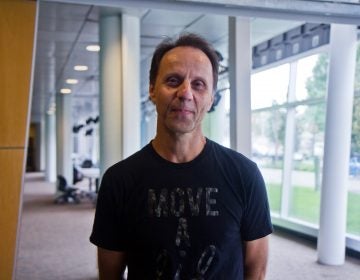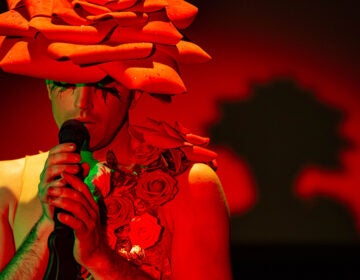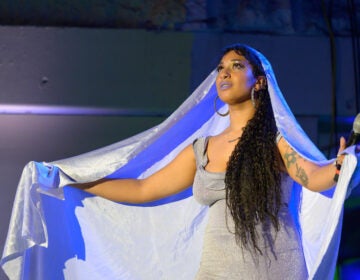Performance art during a pandemic: Fringe Fest takes the stage online
The annual Philly Fringe Festival of alternative and avant-garde performance art begins this week, although in somewhat reduced fashion due to the coronavirus pandemic.
Listen 4:51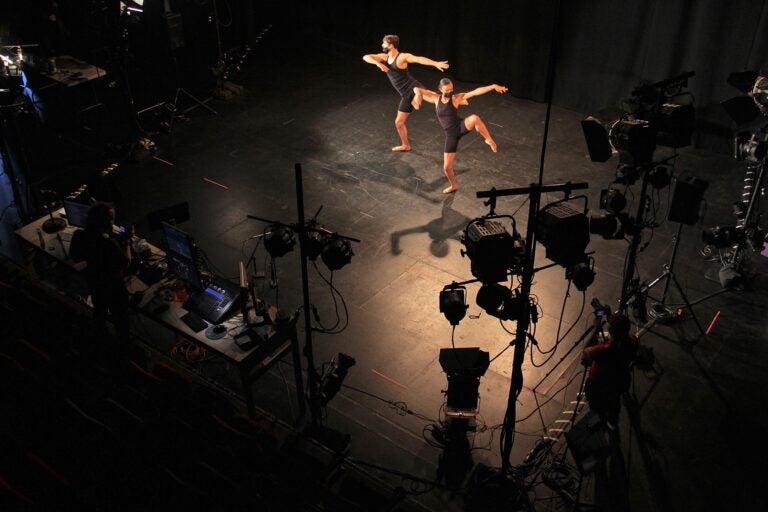
File photo: Dancers from the company Expansions film their Fringe Festival performance, ''Connecting the Distance,'' at the Fringe Arts Building. (Emma Lee/WHYY)
The annual Philly Fringe Festival of alternative and avant-garde performance art begins this week, although in somewhat reduced fashion due to the coronavirus pandemic.
After the festival had to scrap all its plans last March and was forced to re-imagine what it means to create performance art during a pandemic, artists quickly devised various means to present their works in ways that avoid assembling an audience in one space, adding another layer of complexity to a festival already known for being experimental.
“It’s not a couple artists who are trying something new — it’s a hundred plus artists who have been thrust into this new world,” said producing director Nick Stuccio, surprised by the number of participating artists. “I certainly thought we would have far less participation. I don’t why I thought that. I’ve been working with artists for almost 25 years and I should know better!”
For many audience members, one of the challenges – and pleasures – of Fringe is figuring out how to navigate the incredible range of unknown material presented. This year’s festival is smaller than half the size of previous years, with a new challenge of figuring out how to make it accessible.
Some pieces are shown online in real time, meaning they are available only at specific times; others are available to stream whenever you choose to log on. Some pieces are online videos you can watch passively, others are Zoom sessions where you can interact with the performance. With some performances available on-demand, audiences this year are less likely to have to choose to attend one show over another.
Some pieces are a hybrid of online and in real life, or IRL. “Connecting the Distance” is a dance piece by the Expansions Contemporary Dance Ensemble that you can watch online, but only via QR codes posted in certain neighborhoods. Meaning: you have to get outside and walk around.
“It’s hard to be at home all the time. It’s hard to not feel the sun. Movement is important,” said Christina Castro-Tauser, the founder and choreographer of Expansions.
Tauser is forcing her audiences to explore Mt. Airy, where she lives, and the North Philadelphia neighborhood around Taller Puertorriqueno, the Latino cultural center where she works.
“I grew up in Little Havana, Miami, and we walked,” Tauser said. “You had little coffee shop windows and you had moments of community – you might stand outside drinking Nespresso or a Café Bustelo out the window. That sense of walking and being part of each other, even six feet away, even ten feet away – you can wave you can say hello. You can interact.”
Although the City of Philadelphia is allowing theaters to reopen this week, along with indoor dining, at a much-reduced audience capacity, when the Fringe Festival starts just a few days later it will not be offering any indoor performances. In fact, few if any theater companies will take advantage of the city’s newly relaxed COVID restrictions.
“Nobody is doing it. It’s a no-go. It is a bad idea,” said John Jarboe, founder of the Bearded Ladies Cabaret, which has presented work at the Fringe for the last several years.
The Bearded Ladies were planning to have something in the Fringe performance lineup, but pulled out at the last minute. Jarboe says the company – normally nimble and crafty enough to make almost any kind of performance happen on the fly – has been reevaluating itself during the pandemic.
“What is worth going outside your house? What is worth doing?” they said. “That’s a question we’ve been asking a lot over these past months.”
The Bearded Ladies were going to create a mobile stage that would roll into neighborhoods to present cabaret performances. In July, the company bought a 15-foot flatbed truck and began renovating it to be able to fold out a stage wherever it parked.
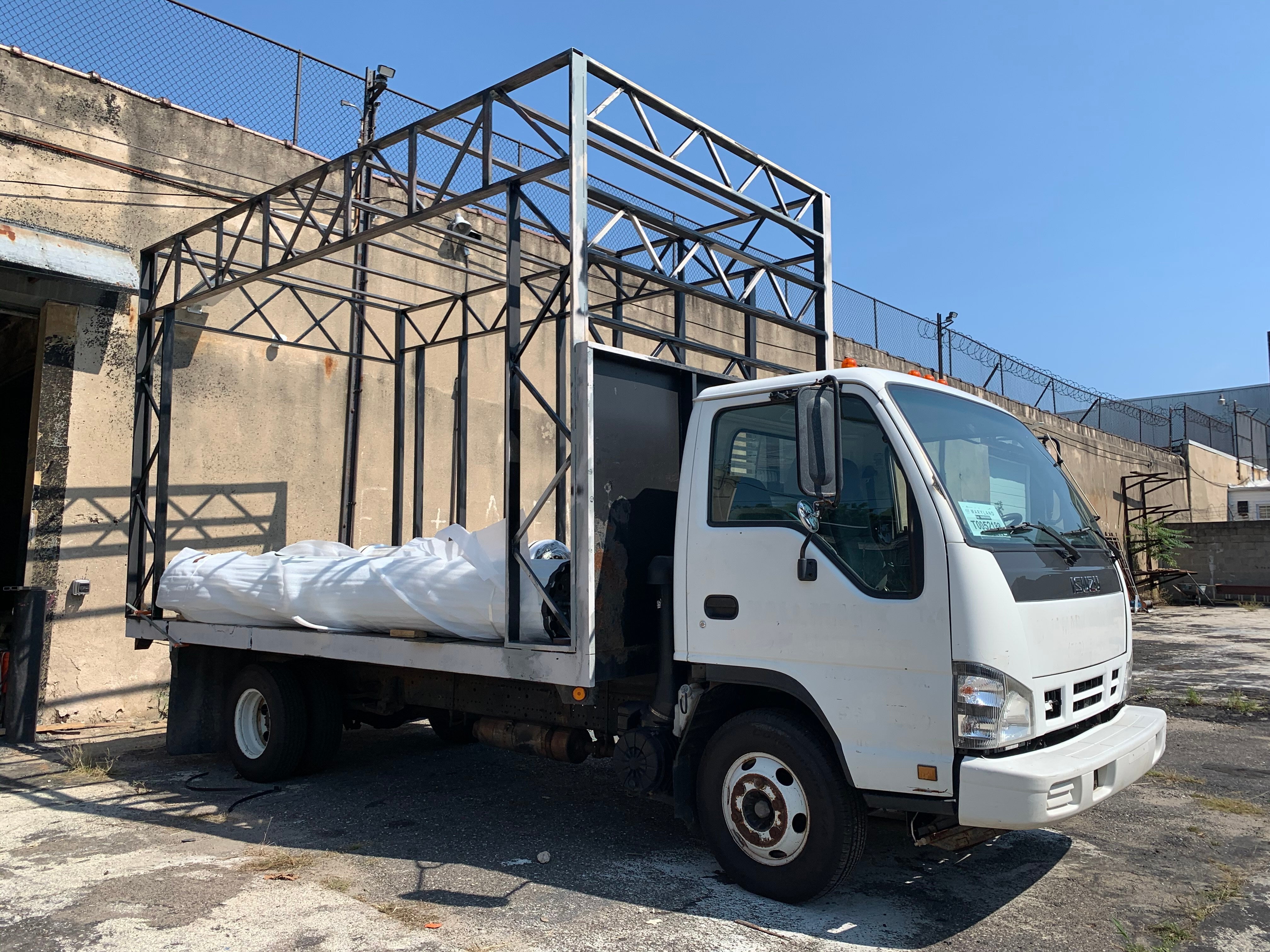
But early August, just a few weeks later, the company changed its mind. Although they could do it this fall, as COVID-19 rates are declined, Jarboe said now is still not the time for in-person performances of any kind.
“There’s the reality of the COVID numbers, and then there’s the emotional and optical landscape,” they said. “Let’s imagine we get complete consent from a block or a park to be there. But then people are Instagramming an image of a performance on a block. We don’t want our optics to lead to bad behavior in a COVID context.”
The Bearded Ladies’ mobile neighborhood stage is now being developed for a spring 2021 debut. Jarboe said the company is using the extra time to develop relationships with neighborhoods to be able to tailor performances specifically to those communities.
The Bearded Ladies will not be completely absent from the Fringe Festival. In October, after the main event is over, FringeArts will extend it with Late Night Snacks: FEAST, a 12-hour marathon of streaming cabaret artists around the world. Jarboe and the Bearded Ladies are working with performers in Paris, Berlin, Melbourne, Seattle, and other cities known for cabaret to design digital performances edited for the camera. Audience members will be sent accoutrements to transform their homes into tiny cabaret spaces for the marathon.
One of the centerpiece performances in the Fringe Festival is by Jaamil Olawale Kosoko, a dancer who is using a combination of live performance online, pre-recorded archive videos of previous work, and online discussion groups.
There is even a reading syllabus for audiences to better appreciate his work.
“We look at the world of so many thinkers that show up in this project. James Baldwin, Audre Lorde, so many thinkers that are incredibly important,” said Kosoko. “I call them my ancestors.”
Kosoko is based in Brooklyn and usually spends much of his time presenting work around the world, but is riding out the pandemic in Philadelphia, in the house of his partner. He said he has a solid support network of friends here.
Even before the pandemic, Kosoko used both digital and live platforms simultaneously to present what he calls his bio-mythographical work. As a Black, gay man born in the U.S. to Nigerian parents, and a student of 20th-century Black intellect, his autobiographical work has many layers. Thusly, he uses many platforms.
“Using the metaphor of my mother, a beautifully ill woman who suffered from schizophrenia and died of cancer and alcoholism,” he said. “This body that was so deeply inflicted with the brutalities of this country in many ways. It’s become a dynamic metaphor in my own thinking about his nation, and this person.”
Kosoko says his work, “American Chameleon: The Living Installments” is about the many ways he “shape-shifts,” changing his persona in order to survive as a queer Black man in America, drawing from the “Black archive,” the history of artwork and thought established by Black and African diasporic artists and writers who came before him.
To Kosoko, the recent street protests this summer in the name of Black Lives Matter following the killing of George Floyd are included in that Black archive.
“In the midst of devastation and disavowal, we continue to dance. Even at the protests people are dancing,” he said. “We’re in a multiplicitous moment where we have these deep intersections of realities converging. I don’t know how our work as artists can’t do the same intersectional weaving and thought work that’s needed to contend with the performances of riotous upheaval and possibility happening outside.”
People who buy tickets to the live online performance also gain access to his server, which is full of older video and dance fragments he has worked on, as well as a portal to an online community of people having discussions amongst themselves which Kosoko hopes will continue long after the Fringe Festival is over.

Get daily updates from WHYY News!
WHYY is your source for fact-based, in-depth journalism and information. As a nonprofit organization, we rely on financial support from readers like you. Please give today.




